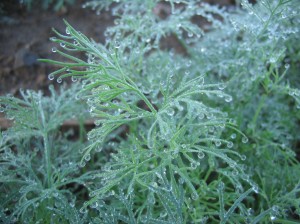Availability, Nutrition, and Recipe Suggestions
In Season: Dill is produced consistently throughout the season, harvests begin in early June and continue through the late fall.
Storage: To store dill wrap in a damp paper towel and place in a plastic bag in the refrigerator. Fresh dill can be kept in good condition for 3-4 days or more.
Preservation: Dill can be washed dried and placed in a freezer bag or in ice cube trays with a little water.
Production Notes: We grow most of our dill for the tender young leaves well suited for most recipes, in the high summer we also produce flowering dill with seed heads which are preferred for pickling recipes.
Varieties: We currently like Hera and Superdukat, both available from Johnny’s Selected Seeds.
Nutrition: Dill is an excellent source of Vitamin A, Vitamin C and calcium. [nutrtiondata.self.com]
Deep Nutrition: Certain components of flavonoids and monoterpenes in the essential oils of dill are anti-congestive and anti-histaminic. They help in clearing over-crowding in the respiratory system due to histamine, allergies or cough. [foodofy.com]
Deep Science: The total volatile oil portion of dill has also been studied for its ability to prevent bacterial overgrowth. In this respect, dill shares the stage with garlic, which has also been shown to have “bacteriostatic” or bacteria-regulating effects. [whfoods.com]
Preparation: Dill should be washed and patted dry before chopping into desired size for meal/recipe.
- Greek Butter Bean Salad with Dill and Tomato [seriouseats.com]
- Turkey-Ricotta Burgers with Leeks and Dill [seriouseats.com]
- Sweet and Sour Cucumbers with Fresh Dill [epicurious.com]
Dill pair well with — Beets, cabbage, carrots, cilantro, cucumbers, eggs, and pickles.
Yum.
authored by: Danny Guillotte & Derek Christianson
Updated February 2019
